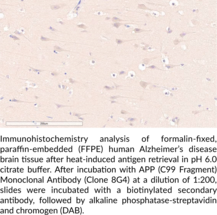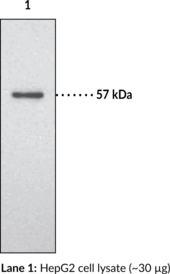Description
Amyloid precursor protein (APP) is a type I transmembrane protein that has a central role in the pathogenesis of Alzheimer’s disease, as well as additional roles in brain development, neuronal plasticity, and memory.{59228} APP is cleaved by β-secretase (BACE) in neuronal endosomes during amyloidogenic processing of APP, generating the C-terminal C99 fragment, which is localized to the endoplasmic membrane.{59223,59224} C99 is further cleaved by γ-secretase, liberating the APP intracellular domain (AICD) and generating amyloid-β (Aβ) peptides of various lengths, including Aβ40 (Item No. 21617) and Aβ42 (Item No. 20574), which are hallmarks of Alzheimer’s disease. APP can also be cleaved by α-secretase during non-amyloidogenic processing of APP, which occurs at the neuronal plasma membrane and generates the neuroprotective soluble APP fragment sAPPα, as well as a variety of other fragments, including the C47 fragment.{59228,59226} Transgenic mice expressing mutant forms of APP exhibit extracellular Aβ deposits in the brain, as well as cognitive dysfunction, and are widely used models of Alzheimer’s disease.{59227} Intraneuronal C99 levels are increased in the transgenic APPE693Q mouse model of Alzheimer’s disease, as well as postmortem frontal cortex from patients with sporadic Alzheimer’s disease.{59224,59225} Cayman’s APP (C99 Fragment) Monoclonal Antibody (Clone 8G4) can be used for ELISA and immunohistochemistry (IHC) applications. The antibody recognizes the C-terminal region corresponding to the C99 fragment to detect intact APP, as well as the C47 APP fragment.
Synonyms: ABPP|Alzheimer’s Disease Amyloid Protein|Amyloid Precursor Protein|Amyloid-β A4 Protein|APPI|Cerebral Vascular Amyloid Peptide|CVAP|PreA4|Protease Nexin-II|β C-terminal Fragment
Immunogen: Peptide corresponding to the C99 fragment of human APP
Formulation: 100 µg of protein G-purified monoclonal antibody
Isotype: IgG2a
Applications: ELISA and IHC
Origin:
Stability: 365 days
Application|ELISA||Application|Immunohistochemistry||Product Type|Antibodies|Monoclonal Antibodies||Research Area|Neuroscience|Neurodegenerative Disorders|Alzheimer’s Disease


